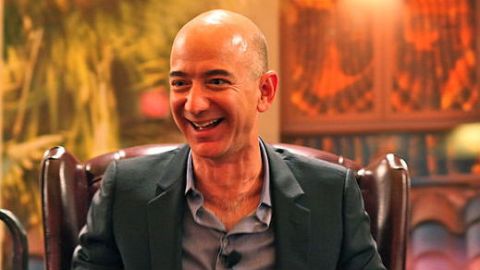Inside the Philosophy of Amazon’s Jeff Bezos

One of things that is kind of fascinating about Amazon is everybody, the average person, thinks about Amazon selling books and now music and Kindles and things like that. But one of the things that they have been doing on the side, which I think is actually kind of one of the big hidden stories of Amazon, is Jeff Bezos believes that Amazon should become a public utility. We don’t have power generators in our backyard, we just plug in to get electricity. We don’t have to dig our own wells. We have water that comes in.
Jeff’s philosophy is if you want to start a website, if you want to start a company, if you need storage and bandwidth, he wants Amazon to be a public utility. You just plug-in and all the storage, all the servers, all the bandwidth that you need is right there, basically accessible without you having to then get a rack, and install the equipment, and buy the hardware, and not knowing whether you need 40 machines or five machines.
I think that this is actually part of the new world where everything is sorted infinitely stretchable and expandable in real time. The ability now to create a company is so much more efficient because you don’t have to guess in advance what you’re going to be able to do with it. Other companies like EMC that provide huge amounts of storage and analytic software are doing the same thing; they’re giving people tools so they don’t have to build these tools for themselves.
A gentleman was telling me recently that there’s so much demand now for storages that they’re actually moving – there are actually FedEx’ing hard drives from San Francisco to New York. It’s actually faster to actually move the physical hard drives than is to have the stuff streaming from one side of the country to the other. The other thing is that nobody throws anything away anymore, like every medical record, every scan, every x-ray, everything that’s being now digital and stored in the cloud.
Juan Enriquez, who wrote one of the essays in my book, was talking about the fact that he thinks that we’re on the verge of a big data crisis already. That were running out of room; we’re running out of bandwidth and space to store all of this. That there has to be another sort of huge leap forward in a way of compressing this data and making it both accessible but also smaller physically in terms of the storage. I think a lot of us read recently about the environmental impact of some of these data centers. They’re trying to put data centers in cold environments because they’re actually generating so much heat now; they’re using up so much electricity.
So I think all of us tend to think of all this as being free; it’s the Internet, it’s free. We’re getting to a point where it’s not to be free anymore, that we’re going to have to find another sort of financial model to benefit from this sort of infinite, infinitely and ever-expanding pool of data and storage.
In Their Own Words is recorded in Big Think’s studio.
Image courtesy of Shutterstock





